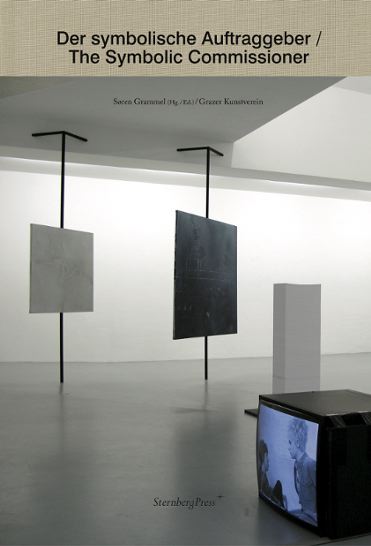| Book launch |
|
„Der symbolische Auftraggeber / The Symbolic Commissioner“ Published by Sternberg Press, Berlin & New York
AKTUELL Präsentation und Diskussion (dt.) mit: Reinhard Braun, Ruby Sircar & Søren Grammel Palais Trauttmansdorff, Burggasse 4 01. März / March 01 19 Uhr / 7 pm
Reinhard Braun (*1964) studierte Kunstgeschichte in Graz und ist seit 1990 mit Veröffentlichungen, Vorträgen und Forschungsaufträgen im Bereich Fotografie- und Mediengeschichte und –theorie tätig. Von 1993 – 98 bzw. 2003 – 2006 ist er als Redakteur und Kurator der Zeitschrift Camera Austria tätig, 1998/99 als Kurator der Medien + Architektur Biennale Graz, in den Jahren 1999 und 2000 Gastkurator am Forum Stadtpark Graz. 2007 - 2010 ist Braun Kurator für bildende Kunst bei steirischer herbst Graz, 2004 - 2010 Lehrbeauftragter für Kunstgeschichte an der FH Joanneum Graz und 2010 Lehrbeauftragter für aktuelle Kunst und Architektur an der Technischen Universität Graz. Ab 2011 Geschäftsführer und Herausgeber von Camera Austria.
Ruby Sircar (*1975) ist Autorin, Kunsthistorikerin, Kuratorin und Künstlerin. Sie unterrichtet in der Klasse für Kontextuelle Malerei der Akademie für bildende Künste Wien. Ihr literarisches Debut gab sie 2006 mit dem Buch »Taschentiger«, erschienen bei Lautsprecher. Sie promovierte an der Akademie der bildenden Künste in Wien/Goldsmiths College, University of London. 2008 erschien die kulturtheoretische Publikation »Liquid Homelands. The Sonic Productions of Second Generation [South] Asian Women«, bei Schlebrügge. Außerdem nimmt Sircar als regelmäßig an Ausstellungen teil, u. a. Shedhalle Zürich, Künstlerhaus Stuttgart, Galerie für zeitgenössische Kunst Leipzig, WUK Wien sowie 2010 steirischer herbst Graz. Als Kurator hat Sören Grammel (*1971) zahlreiche Ausstellungen für Räume der Gegenwartskunst allein oder mit anderen zusammen kuratiert, u.a. in München, Bonn, Düsseldorf, Frankfurt, Leipzig, Malmö, Bialystock/Polen und Oslo. 2005 hat er das Theorie-Buch “Ausstellungsautorschaft”, Frankfurt am Main, veröffentlicht. Er lehrte an der Kunsthochschule Kassel und gab Seminare an der Art Academy Umea und an der Kunstakademie München. Seit 2005 ist er künstlerischer Leiter des Grazer Kunstvereins. Ausstellungen u. a. “Eine Person allein in einem Raum mit Coca-Cola-farbenen Wänden”, “Idealismusstudio”, “Es ist schwer das Reale zu berühren” oder “Provisorisches Yoga”. Die Ausstellung “Die Blaue Blume” wurde in der Zeitschrift frieze unter den best-themed-shows 2007 gelistet.
DEMNÄCHST Präsentation und Gespräch (dt.) mit: Helmut Draxler, Maren Lübbke-Tidow & Søren Grammel Almstadtstraße 48-50 17. März / March 17 20.30 Uhr / 8.30 pm
THE BOOK „Der symbolische Auftraggeber / The Symbolic Commissioner“ English/German 24 x 16.8 cm, 224 pages, 66 color and 2 b/w ill., hardcover, cloth binding € 25.- Søren Grammel (Ed.) / Grazer Kunstverein
With, about, or after Anni Albers, Vojin Bakić, Martin Beck, Christoph Bruckner, Saim Demircan, Luca Frei, Lasse Schmidt Hansen, Heidrun Holzfeind, Marine Hugonnier, David Jourdan, Jacob Dahl Jürgensen, Paul Klee, Katarzyna Kobro, Hilary Lloyd, Marika Lõoke & Jüri Okas, Camilla Løw, Kenneth Martin, Ulrike Meinhof, George Nelson, Silke Otto-Knapp, Vaclav Pozarek, Florian Roithmayr, Giles Round, Nora Schultz, Sean Snyder, Juliane Solmsdorf, Pernille Kapper Williams.
A thematic book including a.o. numerous color views of the exhibitions “Idealismusstudio” and “Die Blaue Blume” (the latter counted among the “Best themed Shows 2007” in frieze magazine, 2008). Both projects took place at the Grazer Kunstverein.
Appreciation for and fascination with many of these preceding experiments, modern in terms of both aesthetics and social politics, but also the complex circumstances of their various disenchantments are the starting points for the artworks and texts and exhibitions published in this book. Turning this around, the question they have in common is this: What possibilities for agency might be gained from newly engaging in an exploration of art as model and its contradictions in contemporary social space? But also: How can the subsequently arising, fundamental doubts about the concept of art as model divest it of its totality, its template-like existence? Because of the troubled history of the 20th century, it is quite right that we have lost the claim of being able to reduce things to one aspect, one perspective or one system. Yet how can utopian thinking still become part of the production of society in today’s culture despite this – or specifically because of – this history?
|

